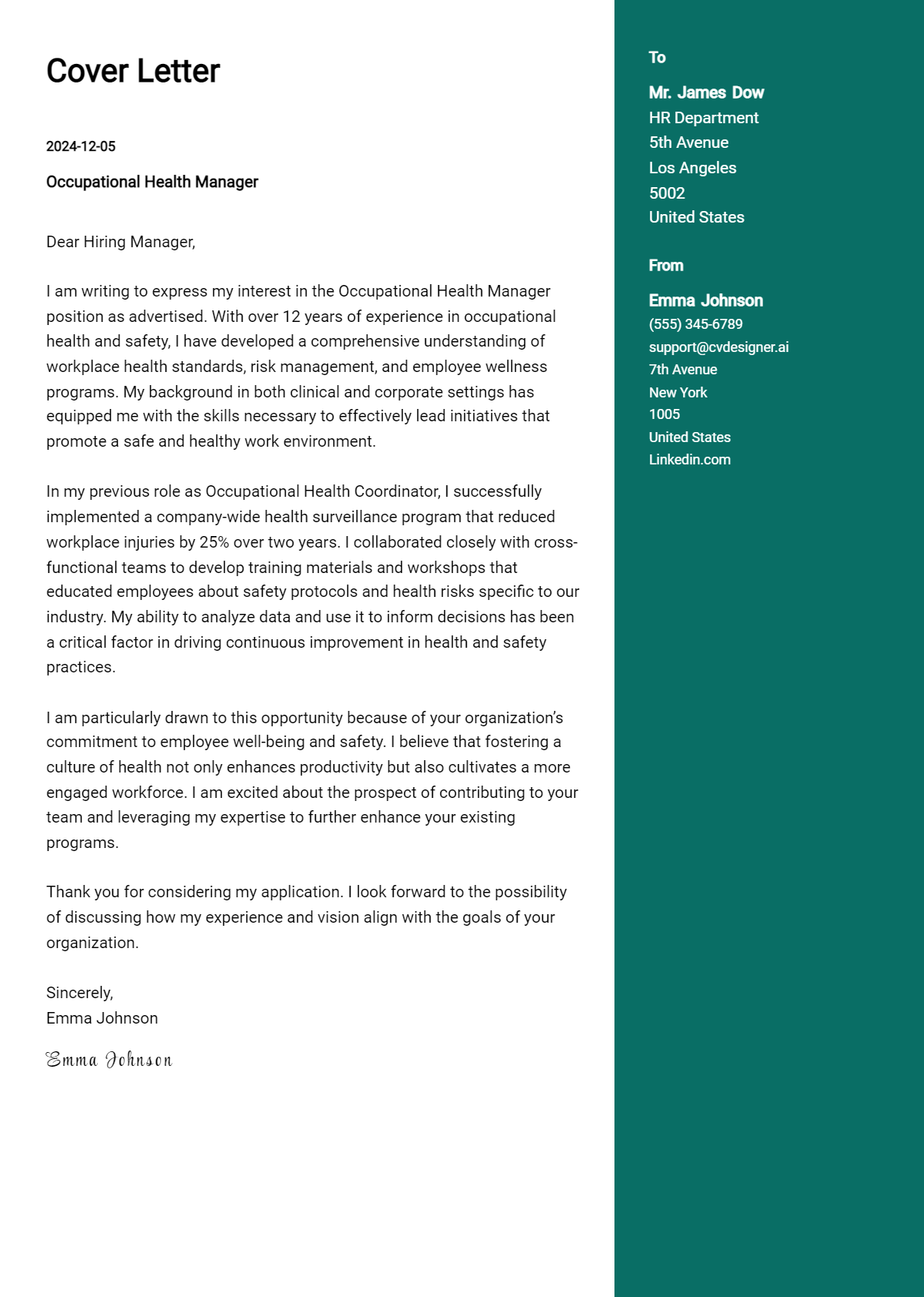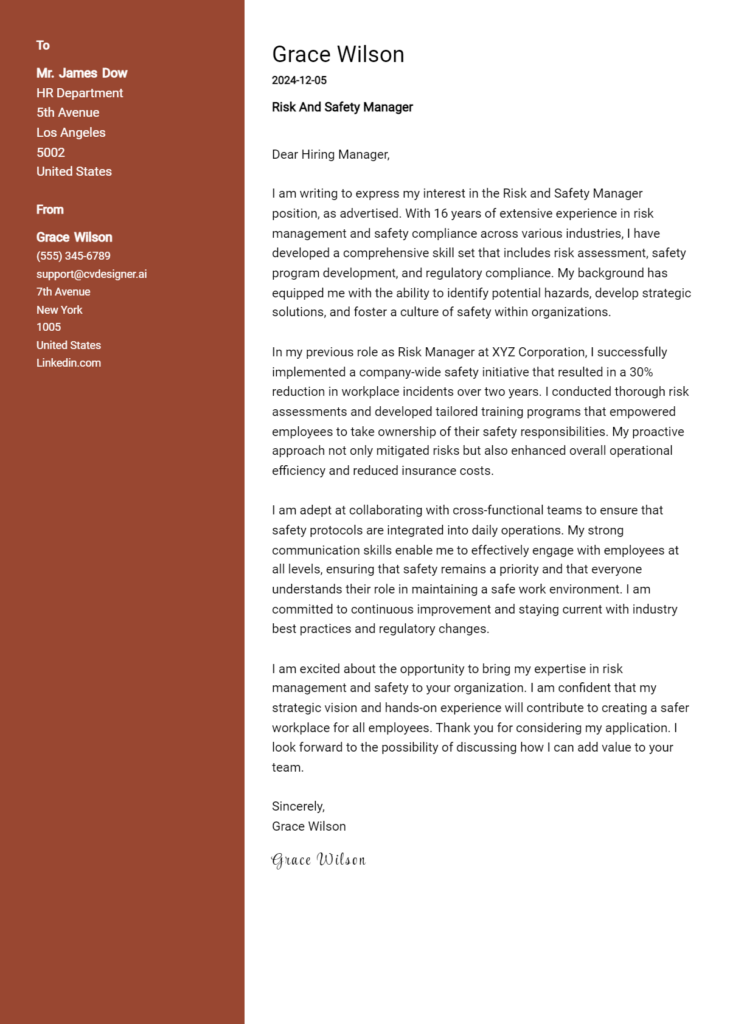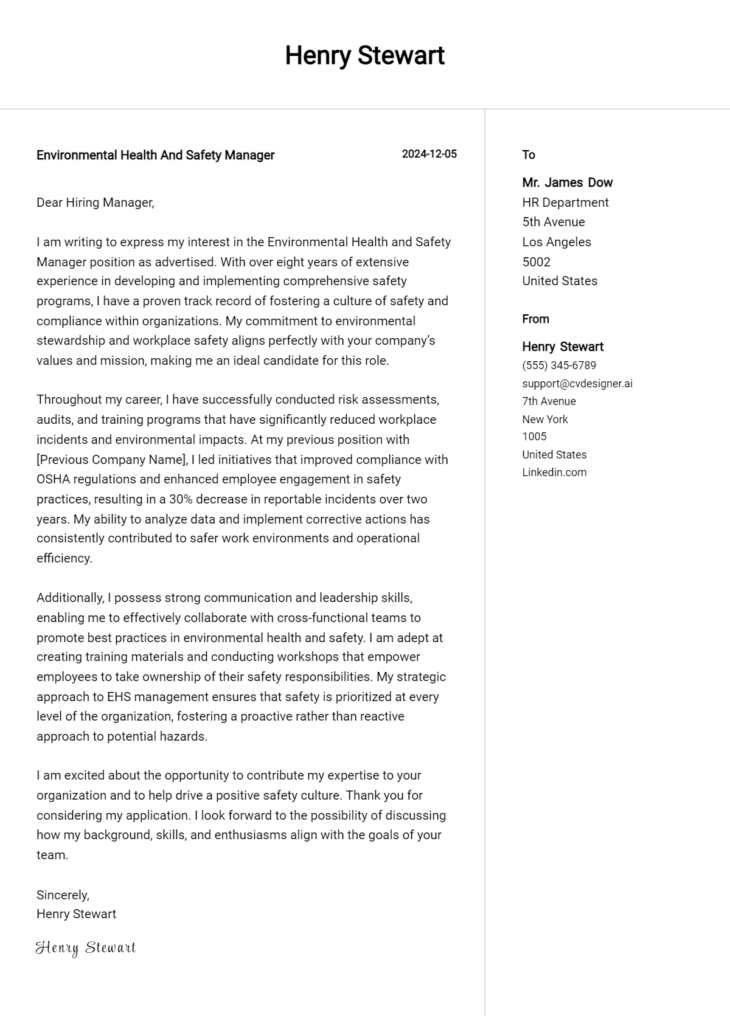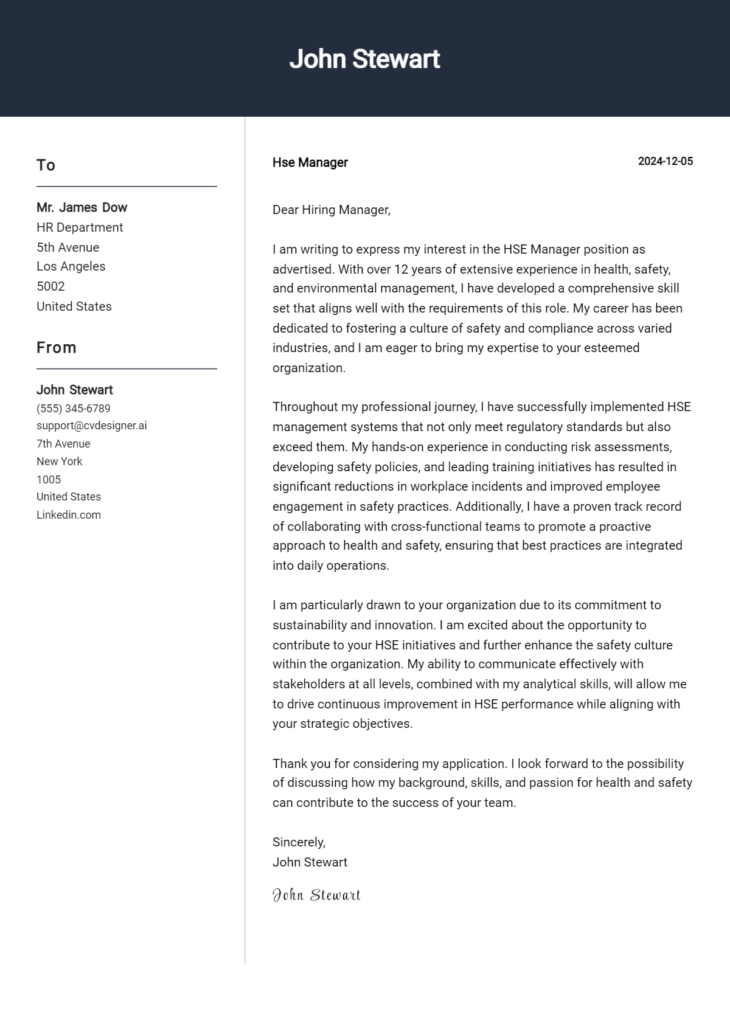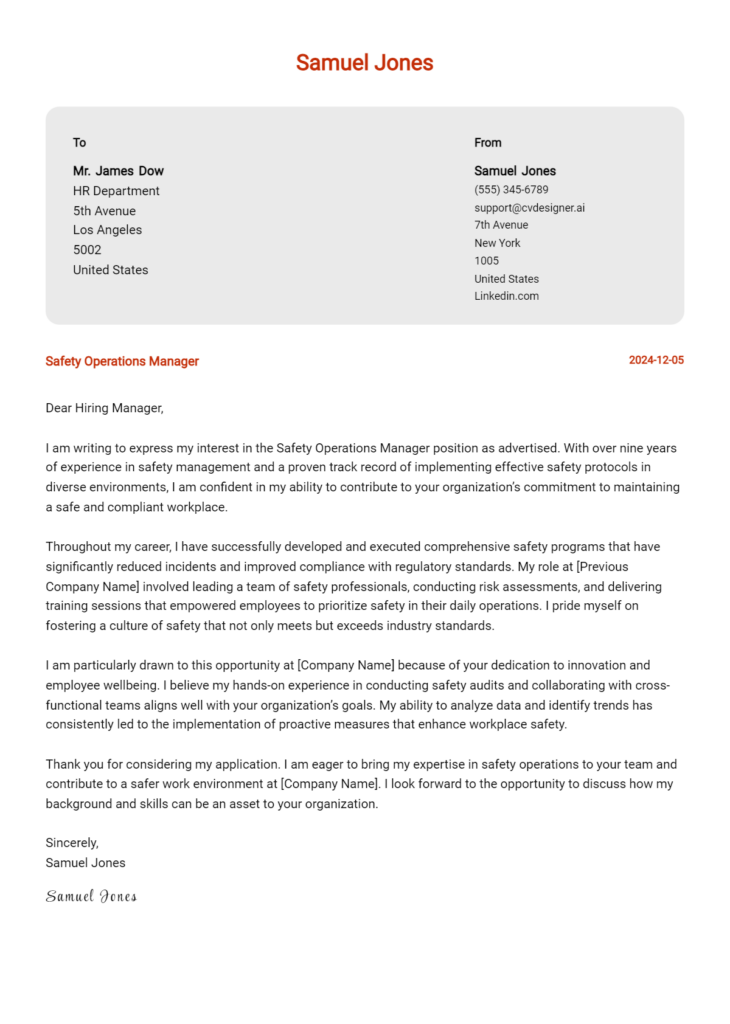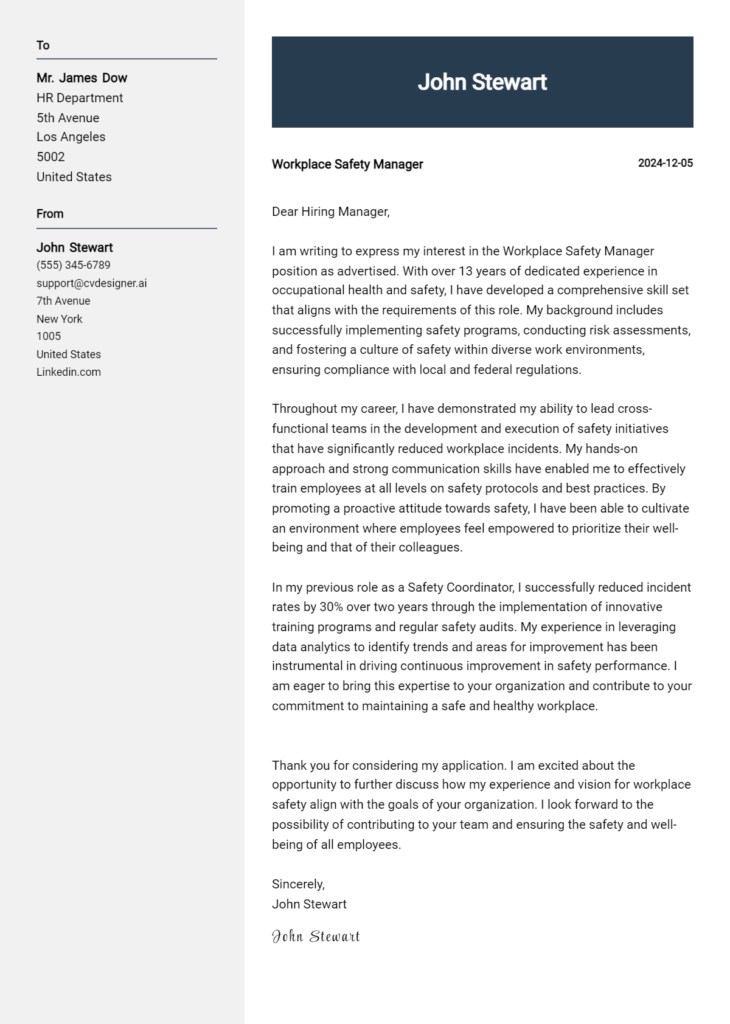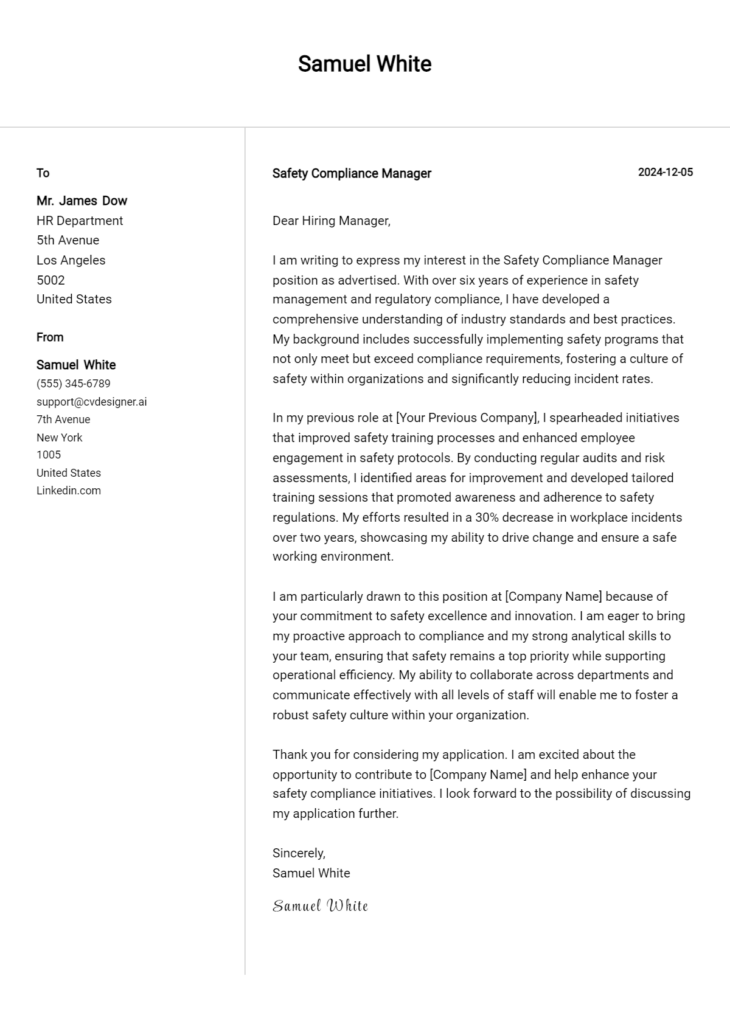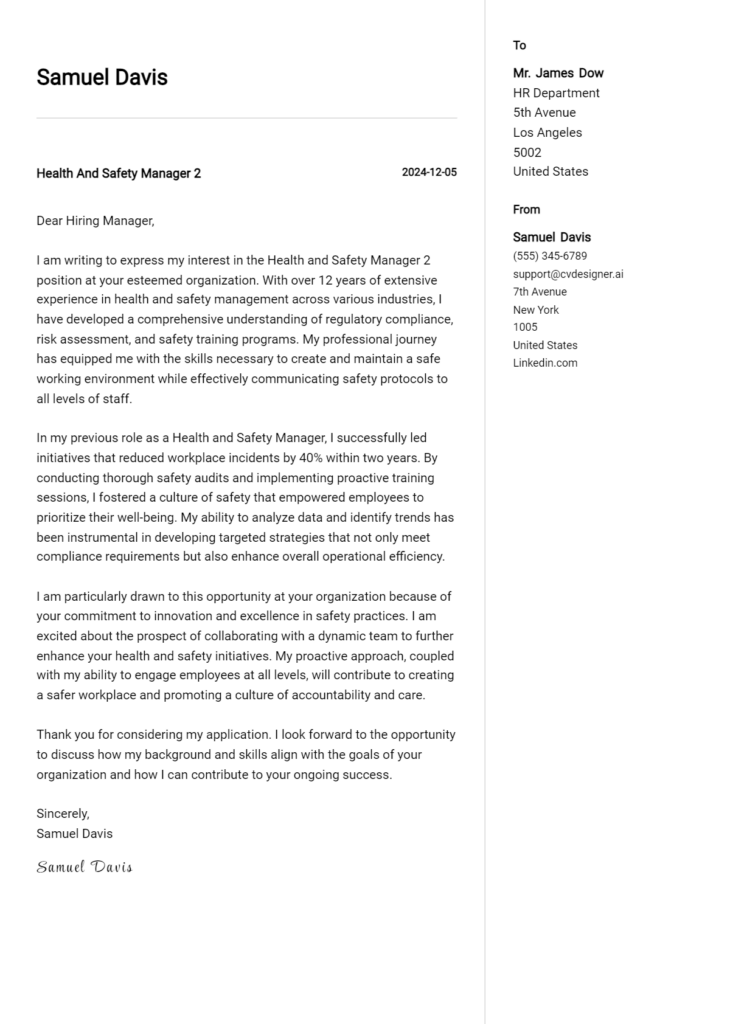Occupational Health Manager Cover Letter Examples
Explore additional Occupational Health Manager cover letter samples and guides and see what works for your level of experience or role.
How to Format an Occupational Health Manager Cover Letter?
Crafting a compelling cover letter is essential for an Occupational Health Manager, as it not only showcases your qualifications but also emphasizes your ability to ensure workplace safety and promote employee well-being. The presentation of your skills and experience is critical, reflecting your commitment to health standards and meticulous attention to detail. A well-structured cover letter captures the hiring manager's attention while demonstrating your professionalism—qualities that are vital in the field of occupational health.
In this guide, we'll explore how to format your cover letter effectively, providing insights and examples specific to the occupational health profession.
We'll cover the essential components of a professional cover letter, including:
- Cover Letter Header
- Cover Letter Greeting
- Cover Letter Introduction
- Cover Letter Body
- Cover Letter Closing
Each section is crucial in highlighting your expertise and commitment to occupational health. Let’s break down these components to help you create a standout cover letter that positions you as the ideal candidate.
Importance of the Cover Letter Header for an Occupational Health Manager
The cover letter header is a critical component of your application as an Occupational Health Manager. It serves as the first point of contact between you and the potential employer, setting the tone for the rest of your letter. A well-organized header conveys professionalism and attention to detail, which are essential traits for someone in this role. The header should include your contact information, the date, and the recipient's details, ensuring clarity and easy navigation for the reader. A strong header not only enhances your credibility but also reflects your ability to maintain a structured approach, which is vital in occupational health management.
Strong Example
Jane Doe 123 Health Way Cityville, ST 12345 janedoe@email.com (123) 456-7890 October 1, 2023 Mr. John Smith Hiring Manager Health and Safety Services 456 Safety Rd Cityville, ST 12345
Weak Example
jane doe email: janedoe@email.com october 1, 2023 john smith
The Importance of the Cover Letter Greeting
The greeting of a cover letter is crucial as it sets the tone for the entire document. A strong and appropriate greeting conveys professionalism and helps establish a connection with the hiring manager. By addressing the recipient directly, you show that you value their time and are genuinely interested in the position. Avoiding generic greetings, such as "To Whom It May Concern," is essential to demonstrate your commitment to the application process. Instead, take the time to research the hiring manager's name, which adds a personal touch and reflects your dedication.
Here are some examples of strong and weak greetings for an Occupational Health Manager cover letter:
Strong Greeting Example:
Dear Ms. Johnson,
Weak Greeting Example:
To Whom It May Concern,
By utilizing a strong greeting, you enhance your chances of making a positive first impression and encourage the hiring manager to engage with the rest of your cover letter.
The Importance of a Captivating Cover Letter Introduction for an Occupational Health Manager
A well-crafted cover letter introduction is crucial for any job application, particularly for a role as vital as an Occupational Health Manager. This introductory paragraph serves as the first impression you make on the hiring manager, establishing your enthusiasm for the position and setting the tone for the rest of your letter. A strong introduction not only captures attention but also succinctly highlights your relevant skills and accomplishments, creating a compelling case for why you are the ideal candidate. On the other hand, a weak introduction can fail to engage the reader, missing the opportunity to showcase your qualifications and diminishing your chances of securing an interview. Below are examples of both strong and weak cover letter introductions for the Occupational Health Manager role.
Strong Example
Dear [Hiring Manager's Name], I am excited to apply for the Occupational Health Manager position at [Company Name]. With over ten years of experience in occupational health and safety, I have successfully developed and implemented health programs that not only comply with regulations but also foster a culture of well-being among employees. My passion for promoting workplace health, coupled with my proven track record of reducing workplace injuries by 30% in my previous role, makes me a strong candidate for this position. I look forward to the opportunity to contribute to your team's success and enhance the health and safety of your workforce.
Weak Example
To whom it may concern, I am applying for the Occupational Health Manager position. I have worked in healthcare for several years and have some experience in occupational health. I think I would be a good fit for the job. Please find my resume attached.
Purpose of the Cover Letter Body for an Occupational Health Manager
The body of a cover letter for an Occupational Health Manager is crucial in demonstrating the candidate's relevant skills, experiences, and overall value to the organization. This section should effectively highlight specific projects or accomplishments that illustrate the candidate's ability to maintain workplace safety, promote employee health, and comply with regulatory standards. By presenting quantifiable achievements, such as successful implementation of health programs or reduction in workplace injuries, the candidate can provide compelling evidence of their qualifications. A well-crafted cover letter body not only conveys expertise but also reflects a genuine interest in contributing to the company’s well-being and productivity.
Strong Example
I am excited to apply for the Occupational Health Manager position at ABC Corp, as my extensive experience in developing and implementing effective health and safety programs aligns perfectly with your organization’s commitment to employee well-being. In my previous role at XYZ Industries, I led a project that reduced workplace injuries by 30% over two years through the introduction of a comprehensive health screening initiative and regular training sessions. Additionally, I successfully collaborated with cross-functional teams to ensure compliance with OSHA regulations, resulting in our facility receiving the Safety Excellence Award in 2022. I am eager to bring my proven track record of enhancing workplace safety and promoting employee health to ABC Corp.
Weak Example
I am applying for the Occupational Health Manager role because I have some experience in health and safety. In my last job, I did some training and wrote reports. I think I can help your company a little bit. I know that health and safety is important, and I hope to make things better at ABC Corp.
Importance of the Cover Letter Closing for an Occupational Health Manager
The closing paragraph of a cover letter is crucial as it serves to summarize your qualifications, reiterate your interest in the role, and encourage the hiring manager to take the next steps, such as reviewing your resume or scheduling an interview. A strong closing leaves a lasting impression and reinforces your enthusiasm for the position, while a weak closing may undermine the overall effectiveness of your application.
Strong Example
Thank you for considering my application for the Occupational Health Manager position. With my extensive background in occupational health and safety, coupled with a commitment to promoting employee well-being, I am excited about the opportunity to contribute to your organization. I look forward to the possibility of discussing how my skills can align with your goals. Please feel free to contact me to schedule an interview at your convenience.
Weak Example
I think I would be a good fit for this job. Please look at my resume and let me know if you want to talk. Thanks for your time.
Crafting an effective cover letter for the role of Occupational Health Manager is crucial in securing an interview and ultimately the job. Your cover letter should not only reflect your technical skills and problem-solving abilities but also demonstrate your understanding of the software development life cycle (SDLC), your experience in teamwork, and a genuine passion for continuous learning. The following tips will guide you in highlighting these essential attributes in your cover letter, making it stand out to potential employers.
Tips for Writing a Strong Cover Letter as an Occupational Health Manager
Highlight Your Technical Skills
Begin your cover letter by showcasing your technical skills relevant to occupational health management. Detail your proficiency with health assessment tools, regulatory compliance, and risk management strategies. Providing specific examples of how you have utilized these skills in previous roles will help demonstrate your expertise and value to prospective employers.Emphasize Problem-Solving Abilities
Occupational Health Managers often face complex challenges that require innovative solutions. Use your cover letter to discuss a specific problem you encountered in a previous position and how you successfully addressed it. This not only illustrates your problem-solving skills but also shows your ability to think critically and make informed decisions.Demonstrate Knowledge of SDLC
Understanding the Software Development Life Cycle (SDLC) is increasingly important in occupational health management, especially with the integration of technology in health monitoring and reporting. Mention any experience you have with SDLC processes and how you have contributed to the development or implementation of health-related software or systems in your previous roles.Showcase Your Teamwork Experience
Occupational Health Managers must collaborate with various stakeholders, including HR, safety teams, and employees. Highlight your teamwork experiences by discussing how you have worked effectively with diverse groups to achieve common health and safety goals. Providing examples of successful collaborations will reinforce your ability to work well in a team setting.Express a Commitment to Continuous Learning
The field of occupational health is constantly evolving, and employers value candidates who are committed to professional development. In your cover letter, mention any relevant certifications, courses, or workshops you have completed. Additionally, express your enthusiasm for staying updated on industry trends and advancements, showing that you are proactive in your career growth.
By following these tips, you can craft a compelling cover letter that effectively communicates your qualifications for the Occupational Health Manager position. For more assistance, consider exploring cover letter templates or using a cover letter builder to streamline your writing process.
Common Mistakes to Avoid in a Occupational Health Manager Cover Letter
Writing a compelling cover letter is essential for standing out as an Occupational Health Manager candidate. Avoiding common mistakes can significantly enhance your chances of success. Here are some pitfalls to steer clear of:
Generic Content: Using a one-size-fits-all cover letter can make you seem uninterested. Tailor your letter to the specific job by mentioning the employer’s name and aligning your skills with their needs.
Lack of Specificity: Failing to provide concrete examples of your accomplishments can weaken your application. Use quantifiable achievements to illustrate your expertise and impact in previous roles.
Ignoring Formatting: A poorly formatted letter can detract from your professionalism. Follow a clear cover letter format that includes appropriate spacing and font choices to ensure readability.
Overly Lengthy Letters: An excessively long cover letter can lose the reader’s interest. Aim for a concise letter that highlights your key strengths in a few paragraphs.
Neglecting the Job Description: Overlooking the job description may lead to missing essential qualifications. Analyze the job listing and incorporate relevant keywords and phrases to demonstrate your fit.
Typos and Grammatical Errors: Mistakes can signal carelessness. Always proofread your letter multiple times and consider using tools or a second pair of eyes to catch errors.
Failure to Include a Call to Action: Not concluding with a strong call to action can leave your letter feeling incomplete. Express your eagerness for an interview and encourage the hiring manager to reach out.
By being mindful of these mistakes and utilizing resources like cover letter examples, you can create a polished and effective letter that showcases your qualifications as an Occupational Health Manager.
Cover Letter FAQs for Occupational Health Manager
What should I include in my cover letter for an Occupational Health Manager position?
In your cover letter, start by addressing the specific job title and company. Briefly introduce yourself and mention how your experience aligns with the requirements of the Occupational Health Manager role. Include details about your relevant qualifications, such as certifications in occupational health and safety, experience in risk assessment, and any leadership roles you’ve held. Highlight your knowledge of regulations and best practices in workplace health management. Additionally, describe your ability to communicate effectively with staff and management, as well as your experience implementing health programs. Conclude by expressing your enthusiasm for the role and your desire to contribute to the organization’s health and safety initiatives.
How do I tailor my cover letter for a specific Occupational Health Manager job?
To tailor your cover letter, start by thoroughly reading the job description and identifying key responsibilities and qualifications. Use this information to highlight your relevant experience and skills. For example, if the job emphasizes developing health promotion programs, discuss any similar initiatives you've led in the past. Incorporate specific terminology from the job listing to demonstrate your familiarity with the field. Additionally, research the company’s culture and values to align your tone and messaging accordingly. Mention any knowledge of the industry or specific challenges the organization faces that you can help address. Personalizing your cover letter shows genuine interest and helps your application stand out.
How long should my cover letter be for an Occupational Health Manager position?
Your cover letter should ideally be one page long, typically between three to four paragraphs. Keep it concise while ensuring that you effectively convey your qualifications and enthusiasm for the Occupational Health Manager role. Aim for around 250 to 400 words, using clear and professional language. The first paragraph should introduce you and state your interest in the position. The subsequent paragraphs should focus on your relevant experience and skills, providing specific examples that demonstrate your capabilities. Finally, use the closing paragraph to reiterate your interest and express your eagerness for an interview. A well-structured, concise cover letter will make a strong impression on hiring managers.
Should I include specific achievements in my cover letter?
Yes, including specific achievements in your cover letter is highly beneficial. Quantifiable results provide concrete evidence of your capabilities and can set you apart from other candidates. For example, if you led a health and safety initiative that reduced workplace injuries by a certain percentage, mention it. Discuss any successful programs you implemented, such as wellness initiatives that increased employee participation. Highlight your experience with audits or compliance measures that resulted in regulatory recognition or awards. These details not only demonstrate your expertise but also showcase your ability to deliver real results in occupational health management, making your application more compelling.
Build your Cover Letter in minutes
Use an AI-powered cover letter builder and have your letter done in 5 minutes. Just select your template and our software will guide you through the process.

